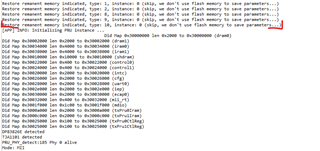Part Number: AM2432
Other Parts Discussed in Thread: SYSCONFIG, DP83869
Tool/software:
Hi,
I have a problem with acyclic data in Profinet.
I am using the SDK ind_comms_sdk_am243x_09_02_00_09 with AM2432.
I created an application that uses the Profinet stack. The cyclic data works correctly, but the acyclic data has this problem. When a submodule with a long length is inserted (in my tests a submodule with 56 bytes of input) and communication is then initiated, the cyclic data works correctly, but if I send a read request for acyclic data I often get no response. The behavior is not constant, sometimes I get a packet with status nca_server_too_busy as a response, sometimes I get no response at all. The callbacks PN_APP_IOD_cbRecordRead or PN_APP_IOD_cbRecordWrite are not called at all in this case. Instead, when inserting submodules with shorter length (in my tests a submodule with 18 bytes of input) cyclic and acyclic data works correctly and the callbacks are called.
What could this problem be due to?
Regards,
Andrea




